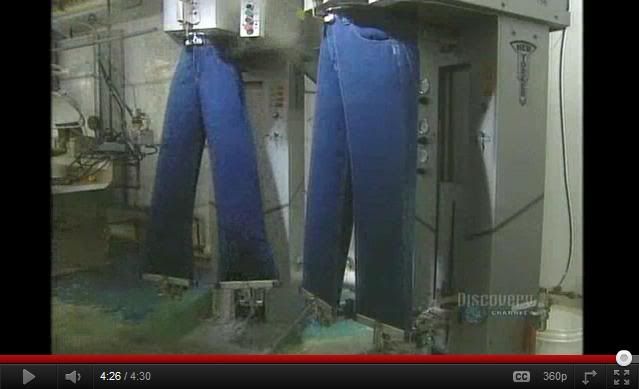Click here to get beautiful emails Click here to join forum
| Sandblasting jeans comes under fire in Bangladesh By Shafiq Alam Suman Howlader was thrilled to land a job in a Bangladeshi factory sandblasting new jeans to make them look old, but he now believes the diktats of fashion have exacted a heavy toll on his health. After working for three years, he started vomiting blood, coughing badly and struggling to breathe before being admitted to a specialist respiratory hospital in Dhaka. Workers' groups say Howlader and many others like him have been misdiagnosed as suffering from tuberculosis because of ignorance about silicosis -- an incurable disease caused by inhalation of silica particles. The minute, fast-moving particles are released during sandblasting, a process used to give new jeans the "worn" look that has been popular for many years around the world. Sandblasting has long been banned in Europe and the United States, but Bangladesh's cheap-labour garment factories still use it to condition jeans for top western brands. Gucci, Levi's, H&M and Gap have all vowed to stop selling sandblasted products, while Dolce & Gabbana has been targeted in an Internet campaign to take a similar stance. "One day, when I was working, blood started gushing out of my mouth and nose," Howlader told AFP from his hospital bed. "They told me the work was safe. But the constant sandblasting made the room fill up with dust and sand. You end up swallowing and inhaling a lot of it." Howlader fired high-pressure sand at denim jeans with just a cloth mask for protection, treating 200-300 pairs in a ten-hour day. "Sandblasting is booming here," said Kalpana Akhter, general secretary of the Bangladesh Center for Workers Solidarity, which records many silicosis-like symptoms among workers in the sector. "Doctors are not looking out for silicosis, so cases get diagnosed as tuberculosis instead," she said. As most Bangladeshi companies have no health insurance, many of those who become sick simply quit their jobs and return to their villages in dreadful health, she added. Tens of thousands of Bangladeshi workers are involved and at least 500 factories use sandblasting, said Khorshed Alam, who runs a labour rights group. "Workers hardly have any protective gear to prevent (silica) dust from entering their system," he said. According to Alam, many large factories are aware of the health risks of sandblasting and to avoid potential liability they often subcontract out the work to small, standalone factories. "We used home-made compressors and sand-guns, which are 20 times cheaper than the ones used by big jeans plants," Delwar Hossain, supervisor at the small Meridian unit in Dhaka, told AFP. Because of the high pay -- 7,500 taka ($100) a month or double the minimum wage -- they have no shortage of workers like Mohammad Ilias. With only a thin cloth wrapped around his face, the 21-year-old from a village in the country's remote north was blasting sand with a homemade pressure-gun onto a pair of new jeans. "In some factories, they use masks and other gear to keep sand off. But here we use cloth... there is no escape from sand. But we've got used to it," he said. "I swallow so much sand doing this work but enough water and a banana a day sort out the health problems. I don't mind inhaling sand as long as the wages are good," he said. The labour rights group Clean Clothes Campaign has run a successful campaign to shame famous brand names into using other, safer, techniques but in Bangladesh it remains profitable and therefore common. Gap told AFP that it halted all sandblasting at its Bangladeshi suppliers in August following a review last year, though for many local factory owners there is an acceptance that the needs of fashion overrule health concerns. "We are still a LDC ('least developed country'), please don't think that we are Switzerland," said Shafiul Islam Mohiuddin, head of the Bangladesh Garment Manufacturer and Exporters Association, explaining that a national ban was unlikely. Such attitudes mean a full-scale tragedy among Bangladeshi sandblasters may be going undetected, believes Ineke Zeldenrust, a spokeswoman for the Clean Clothes Campaign. "We worry that we will see a similar scenario in Bangladesh as in Turkey," she said, where dozens of workers -- some teenagers -- developed acute silicosis and died, prompting public outcry before a ban was enacted in 2009. But workers such as Asma, who is also being treated in the Dhaka chest hospital, say they have no choice but to continue sandblasting. "The disease has eaten all my savings. If I don't work, I can't eat," a gaunt and skinny Asma, 25, told AFP before discharging herself from hospital and going back to work.
|
How It's Made Jeans
Today jeans are a very popular form of casual dress around the world and come in many styles and colors.
http://www.nidokidos.org/threads/80350-How-It-s-Made-Jeans
Stop emails | Join Us by Email | Join from Web | Visit Yahoo! Group | Join Nidokidos Forum
Join nidokidos Group for best of forwarded mails
http://groups.yahoo.com/group/nidokidos
nidokidos-subscribe@yahoogroups.com
Be the part of Nidokidos , Join our Forum
http://www.nidokidos.org
===================================================




No comments:
Post a Comment